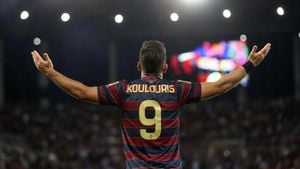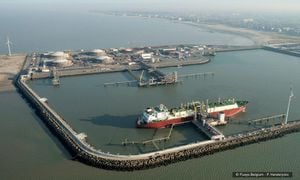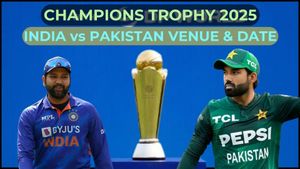Emmanuel Macron is gearing up for his much-anticipated visit to Washington next week, aiming to solidify Europe’s position on the pressing issue of the Ukrainian conflict. Following recent comments by former U.S. President Donald Trump, wherein he described Ukrainian President Volodymyr Zelensky as a “dictator without elections” and suggested Ukraine “should have never started this war,” Macron appears set to present a collective European analysis aimed at emphasizing support for a negotiated resolution of the conflict. He will stress the need for Europe's sovereignty and security at the forefront of discussions.
Confirming Macron's trip, Mike Waltz, U.S. National Security Advisor, recently stated during an interview with Fox News on February 19, detailing preparations made alongside Benjamin Haddad, France's Minister Delegate for Europe. The visit is structured to facilitate strategic discussions primarily centered on resolving the conflict and bolstering transatlantic cooperation.
This diplomatic endeavor is significant against the backdrop of growing unrest and criticism directed toward Macron’s approach to the Ukraine crisis. Florian Philippot, president of the French political party Les Patriotes, articulated the difficulty Macron may face during the discussions, remarking, “I think he has been called to Washington and difficult conversations await him. Generally, when he meets Trump, it always follows with Macron’s humiliation.” His comments suggest fears of Macron faltering under pressure, particularly as he seeks to soften rhetoric surrounding Russia, hoping for what some perceive as continuing warlike attitudes from French leadership.
Philippot’s assertion reflects growing domestic discontent, with critics urging Macron to pivot toward peace dialogues instead of protracting military engagements. “Unfortunately, we have leaders who prefer to get bogged down within the European Union and have a warlike vision of hate against Russia. That makes no sense,” he stated, emphasizing his conviction of the need for dialogue over conflict.
Contrasting this view, Fabien Roussel, Secretary of the French Communist Party, advocates for direct discussions with Russia to achieve peace, challenging the effectiveness of transatlantic exchanges when addressing European security. This disagreement within the French political sphere on how to engage with Russia and manage the conflict suggests unresolved tensions not only within Europe but also between allies.
The geopolitical stakes are high, and Macron's visit is seen as part of larger strategic recalibrations needed to respond to the shifting dynamics of international relations. Sébastien Lecornu, the French Minister of the Armed Forces, has addressed the need for bolstering France’s military capacities against the threats posed by the war in Ukraine and has hinted at decisions requiring political and budgetary choices. He assured, “It will require political and budgetary choices,” which some, including critics, interpret as an urgent call for enhanced defense spending and readiness.
With Macron emphasizing cooperative efforts during his meeting, it remains to be seen how well he can harmonize the varying expectations from different political factions both at home and abroad. The discussions may extend beyond immediate strategies for Ukraine and rightfully engage with deep-rooted issues of European security.
Macron and his administration contend with urgent defense matters, as highlighted by Lecornu's recent statements, which signal France's ambition to accelerate its military capabilities. The 2024-2030 Military Program Law outlines substantial funding to expand France’s defense with growth anticipated. “We must look at the future with worry,” Lecornu cautioned, hinting at the imperative nature of these enhancements amid growing tensions throughout Europe.
The upcoming meeting is not only significant for addressing the Ukraine situation but also plays a pivotal role in redefining EU-U.S. relations. Macron’s diplomatic prowess will be tested as he seeks not only to cement collective European support but also to navigate the complex web of critiques vying for attention back home.
With looming geopolitical uncertainties and questions about the efficacy of international alliances during crises, Macron stands at the forefront of redefining France's foreign policy. The outcomes of discussions with U.S. leadership could have far-reaching impacts on European security and the future of transatlantic collaborations.



